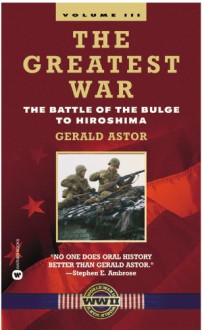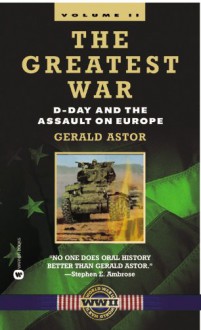
This book - Volume III of "The Greatest War" trilogy chronicling the American combat experience in the Second World War - should be read and cherished by any reader who (like myself) has/had a parent or relative who served in the U.S. military during the war. What is more: any reader with an interest in military history or in understanding the stresses placed upon the psyche of combatants in war should read this book.
Many times in reading the eyewitness accounts by the veterans who fought in Europe in the immediate aftermath of Operation Cobra (i.e. the breakout at Saint-Lô in Normandy, where my father's unit played its part in July 1944), Operation Market Garden, the Battle of the Bulge and the subsequent battles across the Rhine River leading up to V-E Day on May 8, 1945 ---- as well as the submarine war waged by the U.S. Navy in the Pacific, the air wars against both the Germans and Japanese in the latter part of 1944 and 1945, and the battles of Saipan, Tinian, Guam, Peleliu, Iwo Jima, the Philippines and Okinawa culminating in the decisions to drop the atomic bombs on Hiroshima and Nagasaki ---- I was both sobered and overawed by the sacrifices made by the combat veterans. One example I'd like to cite is the following remarks made by the actor Tom Poston, who remembered waiting impatiently for an opportunity to aid the Americans trapped in Bastogne during the height of the Battle of the Bulge:
"It was socked in. You couldn't fly, couldn't take off because of the weather. You couldn't see. Every day we'd go down to the radio room, getting ready to go, because we knew the guys were desperate. Finally, around Christmas, they said, 'Okay, it looks like it's going to open up.' We flew in weather all the way, got to the drop zone and pop! it was clear. We went down and dropped the parabundles. The sounds of a plane's engines are pretty loud, and there were a bunch of us, so it was pretty noisy. But the guys came out of the woods where they had been hiding and fighting and you could hear them cheer. That's how loud they were yelling. It was gratifying as hell. It suddenly seemed it was worth doing, accomplishing something." (Poston had served in Europe as a pilot in the U.S. Army Air Force's (USAAF) Troop Carrier Command, bringing the paratroopers into Normandy and Holland.)
With the ranks of Second World War veterans growing now ever thinner with each passing year, reading books like this one should give readers pause and a greater appreciation for their service.


 Log in with Facebook
Log in with Facebook 








